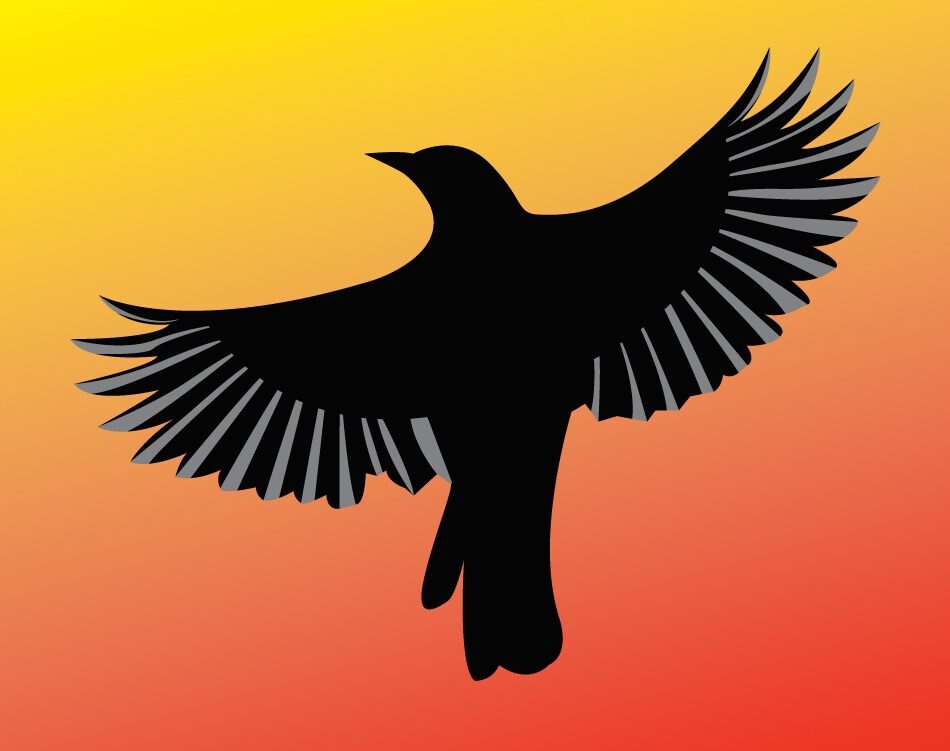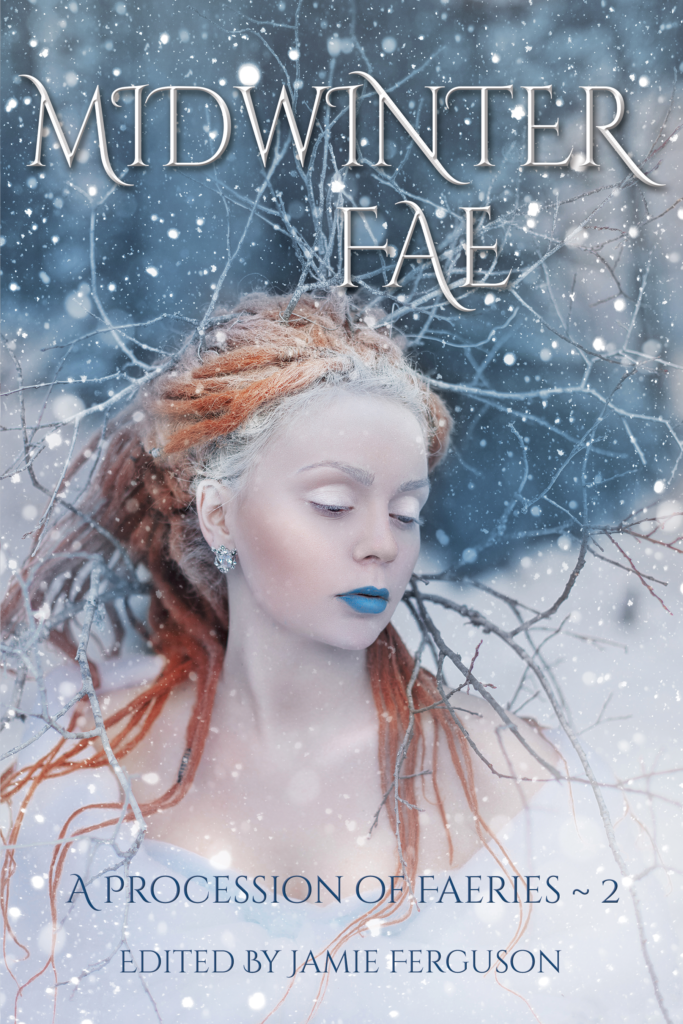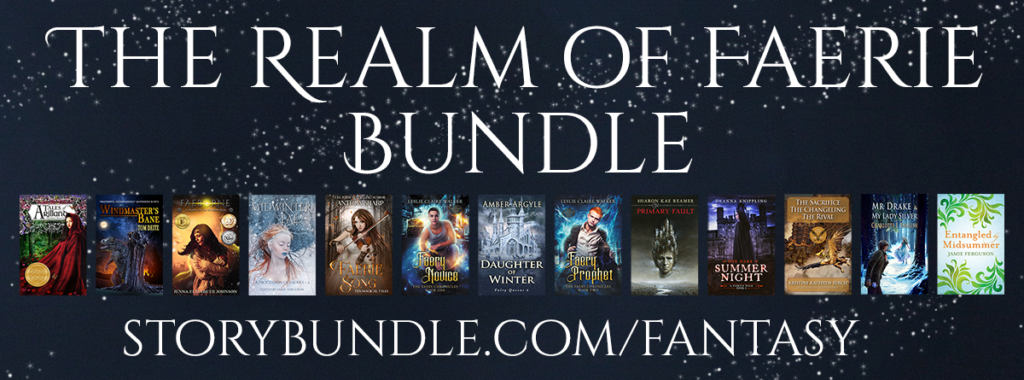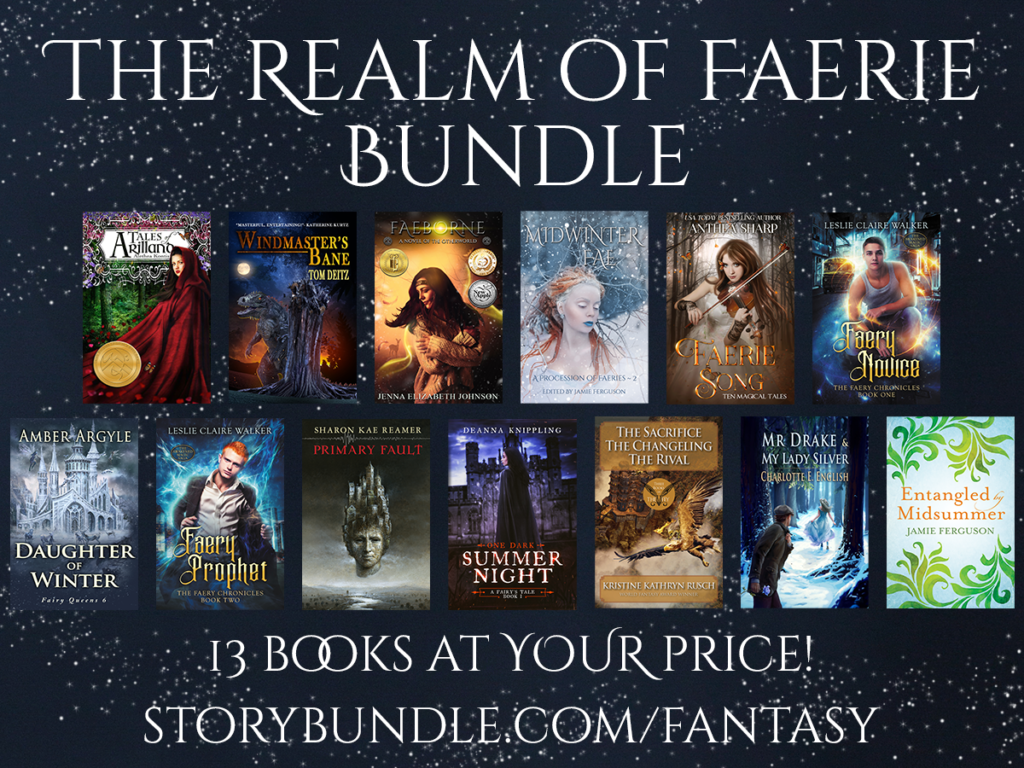Interview: Midwinter Fae authors – Part 4
Midwinter Fae, the second volume in the anthology series A Procession of Faeries, brings you nineteen tales of magic, beauty, wonder…and sometimes danger, as the Fae can be unpredictable, and follow their own rules.
Midwinter Fae is available for a limited time in The Realm of Faerie bundle.
Enter the Realm of Faerie, a world of beauty, danger, and enchantment. But remember the legends if you want to make it back home again…
The Interview
Part 4 of the Midwinter Fae author interview includes:
- Jamie Ferguson, author of “The Kiss of the Horned God”
- Marcelle Dubé, author of “Midwinter Run”
- Dayle A. Dermatis, author of “The Madness of Survival”
What do you enjoy about weaving elements from mythology, legends, and folklore in your own writing?
Jamie Ferguson
I love reading stories that incorporate elements from mythology, legends, and folklore…so I enjoy writing the kinds of stories I want to read. 
Marcelle Dubé
I like incorporating stories from myth, legend or folklore into my own French-Canadian traditions, just to see what will happen. I especially like exploring how “modern” humans would react if they encountered these creatures from myth. I love hearing the echoes of these stories rolling down the centuries.
Dayle A. Dermatis
Mythology, legends, and folklore are based on fundamental truths, stories, and energy from time immemorial. We each interpret them in different ways, but the fact that the same stories appear in wildly different cultures at roughly the same time, when those people had no known contact with one another, has to give you pause and make you think.
As a writer, I walk the line between telling lies/making stuff up and searching for the universal truths and connections between people. Exploring myths and legends allows me to do both.
What do you find most interesting about the mythology/folklore associated with Midwinter?
Jamie Ferguson
We lived in West Germany and the Netherlands when I was a kid, and would go to Christmas markets (Christkindlmärkte) every year. It felt like a magical time, walking around in the cold, with lights sparkling, decorations hanging, and enjoying festive food and drink while admiring all of the fun and beautiful things for sale. Our family also incorporated some of the traditions of where we lived, like that of leaving out our shoes the evening of December 5th for Saint Nicholas (aka our parents) to put little gifts in.
Midwinter feels like a magical time to me, which I think is mostly because of the festive, sparkling, exciting feeling I always had at this time of year when I was growing up. It’s probably also because in northern Europe, our days were short. My sisters and I would wait for the school bus in the dark and come home in the dark, so the increase in the amount of daylight was a very tangible thing for us.
Midwinter is a turning point, where the days begin to lengthen. Imagine what it must have been like for the ancients to celebrate the arrival of the winter solstice at one of the henges or monuments which were built to align with the solar cycle. That yearly reminder that winter would (eventually) end, and that you wouldn’t run out of food or fuel, must have been exciting—and comforting.
To me, the most interesting parts of the mythology around Midwinter deal with the risk that winter might not end after all—the battle between the Holly and Oak kings, the robin and the wren, the Horned God dying and then being reborn at Midwinter. We now know that winter will always end, but imagine how mystical and magical this must have seemed to people thousands of years ago?
Marcelle Dubé
The idea of a time of year where the veil between the world of the living and that of the dead thins is fascinating. I really like the idea of the two worlds crossing over. Of the various stories that come to us from folklore and mythology, I really like the one about the Wild Hunt, in which a spectral leader rides at the head of a host of faerie, or spirits, or men mounted on wild horses, accompanied by black hounds with red, rolling eyes, to the sound of howling, pounding hooves and fierce winds.
It’s thrilling. Terrifying. But wouldn’t you want to see it for yourself?
Nobody’s sure what they’re chasing—is it a beast? A man? The spirits of the dead? Does it matter? All we know is to hide when we hear them coming—hide and hope they don’t come after us.
So, knowing all this, what kind of woman would deliberately taunt the Wild Hunt into helping her? A desperate one.
Dayle A. Dermatis
Turning of the Wheel, from dark to light. We’ve lost the focus on seasons, and are expected to work the same jobs no matter what. But autumn will always be harvest, and winter will always be about family, hearth, and home, and the time to work on indoor projects.
Mythology and fairy tales often incorporate aspects from the locale in which they originated. For example, selkies appear in folktales from the Northern Isles of Scotland, the Faroe Islands, and Iceland. Is there an area of the world that you particularly enjoy including in your writing, whether from a mythological aspect, a geographical one, or both?
Jamie Ferguson
There are two main areas that I really enjoy incorporating in my writing: Celtic mythology and folklore, and what I’ll loosely refer to as Mediterranean geography and mythology.
I’ve loved Celtic mythology since I was a kid, and still love reading stories that include elements of it, so it’s not surprising that I also enjoy incorporating this in my own writing. The more research I’ve done on Celtic mythology and folklore for my own stories, the more I realize how many interesting variants there are that I either don’t know much about, or never heard of before. For example, Cù, the faery dog in my novel Entangled by Midsummer, is very loosely based off the mythological Cù-sìth, which I vaguely remembered from different stories I’d read over the years. In researching Cù-sìth for my story I came across the folklore of the black dog, and after one look at that Wikipedia entry I realized just how many different tales and legends there are, and how much they can vary from place to place. I now feel like I’ve barely scratched the surface, and have lots more to learn about Celtic mythology—and a lot more stories to write!
I also enjoy writing stories set in the ancient Mediterranean. I’ve written one short story set on the Aeolian Islands around 1500 BC, and am currently working on a novel that begins in Pompeii—in A.D. 79, of course, right before Vesuvius erupted. 
Marcelle Dubé
I love the Scandinavian countries and their myths, in particular, myths about trolls. The harshness of the climate juxtaposed against the beauty of the landscape. The hardiness of the inhabitants. The risk of encountering a troll on a lonely path. I imported trolls from Norway to North America in “Troll Country,” in which our intrepid heroine must face the troll who murdered her father when she was a child.
Norway, Sweden, even Iceland… they are similar to Northern Canada, where I live. I guess it’s not much of a stretch to imagine how creatures from the Old World would fare in the New World.
Dayle A. Dermatis
I’ve been interested (okay, obsessed) with Wales since I was a wee lass. The Taran Wanderer series, the Welsh-based books in The Dark is Rising sequence, and possibly others I’ve forgotten, sparked my desire for more. I studied in Chester, England, in college, and visited north Wales; and then I had the opportunity to live in south Wales for four years.
I find all of the British Isles magical in many ways, so that area ends up in my writing quite a bit!
Is there something from a legend, fairy or folk tale, or myth that you haven’t yet used in your writing, but would like to?
Jamie Ferguson
Yes—it’s a long, long list.
One area I’m really interested in researching and using in my writing is Slovakia. All of my great-grandparents on my mother’s side emigrated from eastern Slovakia in the early 1900s, and not much of the history or folklore made it to my generation. I’d like to learn more, and incorporate this in a story or two at some point.
Marcelle Dubé
There’s an old French-Canadian folk tale called La Chasse-galerie, or The Flying Canoe in English. Some say it’s actually a variation on the The Wild Hunt. The French-Canadian version features a few lumberjacks stuck in camp on New Year’s Eve. They know that back home, there is feasting and dancing, and they miss their loved ones.
They decide to make a pact with the devil to get them home for the night. No slouch, the devil agrees. He produces a magical canoe that will fly them the hundred miles home in no time at all. They must give over their crucifixes and crosses and swear not to speak the name of God on the journey or touch any cross on the church steeples they pass, or they will forfeit their souls.
There are so many ways this can go wrong. But it has French-Canadian lumberjacks, the devil and the risk of losing your immortal soul… that’s hard to resist…
Dayle A. Dermatis
I like taking different culture’s tales and comparing them. I have a note in my idea file about African bug gods and “Beauty and the Beast,” although I don’t yet know where it’s going, exactly.
Another is Hans Christian Andersen’s “The Snow Queen.” All of his stories are uncomfortably religious for me, but the fact that the Snow Queen has snowflake bees makes this tale a story I want to explore in a deeper level.
Question for Jamie Ferguson:
In your stories, you play around a lot with the idea that there are opposing forces or opposing characters that represent opposing forces at work in ways that drag other people’s lives around with them. Where do you think that idea comes from? Here, the “opponents,” although not necessarily enemies, are pretty clear cut, but you have other stories where the opposition is much more subtle, and the “defeat” of one force by the other is more of a rebalancing. Do tell!
It’s funny how obvious this kind of thing is after a story is written, but it’s not at all obvious during the actual writing. 
I hadn’t thought about this as opposing forces, but that’s a good way to put it. In “The Kiss of the Horned God” the “opponents” are representations of summer and winter, and “defeat” is a temporary thing as the battle between the two occurs every Midwinter and Midsummer. In other stories I’ve written it’s more clearly about good versus evil, or right versus wrong, to either a lesser or greater degree depending on the tale I’m telling.
I’ve accepted that this type of thing is going to show up in my writing whether or not I plan it. 
Question for Jamie Ferguson:
In this story, you imply that this isn’t the first time the events of the story have played out. Did you have any other characters in mind for the previous times that these two powerful forces met?
“The Kiss of the Horned God” is set at Midwinter, where there’s a conflict between winter and summer, holly and oak, darkness and light. I didn’t think through the specifics of what might have happened in this world in previous Midwinters, but I did set up this story so that something different happens every year. I also implied that something similar happens every Midsummer…so I’ll just have to write another story set in this world to find out more myself!
Question for Marcelle Dubé:
I already have another story in this world.
In “Midwinter Run” Annalise mentions the time her parents went to Montreal to see the opening of the Great Victoria Bridge. The building of the bridge was crucial to the Fey, who had been trapped on the island of Montreal since they were first tricked into coming there. To say much more about how the Fey came to Canada would spoil too much, but I do tell their story in “Skywalkers.”
Question for Dayle A. Dermatis:
In “The Madness of Survival,” Eva was taken by the Fae when she was a child. Now grown, Eva, and others like her who escaped from Faerie, work to keep other human children from being stolen. What inspired you to not only incorporate motorcycles into this story, but to also include hints that perhaps there’s a little more to the motorcycles than it might appear?
The first niggle of an idea came from the fact that there are Hell’s Angels groups that accompany abused children to their hearings and make a presence in the courtroom. The child is afraid of her abuser, but can look at these burly, confident men to protect them from their abusers and give her the strength to confront them. I love the idea of the “bad” Hell’s Angels doing such kind work.
I think the idea of these broken people who’ve been kidnapped into Faerie and then booted out, and nobody believes them, and they band together, is really compelling. They were screwed up, and yet they can rise above that enough to save other children from the same fate.
My husband and I have traveled a good chunk of the world on a motorcycle. Mercedes Lackey played with the idea of bespelled motorcycles in two of her series, an idea I’ve always loved. That’s where I got the Magical Motorcycle theme for Uncollected Anthology, where this story first appeared.
As for the motorcycles in my story, could they be bespelled fae creatures that accompanied the human survivors when they came home? Maybe…
Find the authors!
Jamie Ferguson
Website ~ Facebook ~ Instagram ~ Pinterest ~ BookBub ~ Amazon ~ Twitter ~ Goodreads
Marcelle Dubé
Website ~ Facebook ~ Twitter ~ BookBub ~ Goodreads
Dayle A. Dermatis
Website ~ Facebook ~ Twitter ~ BookBub ~ Amazon ~ Goodreads
Find The Realm of Faerie bundle!
This bundle is available for a limited time at StoryBundle.com/Fantasy.
Bundle buyers have a chance to donate a portion of the purchase price to the charities Mighty Writers and Girls Write Now!



